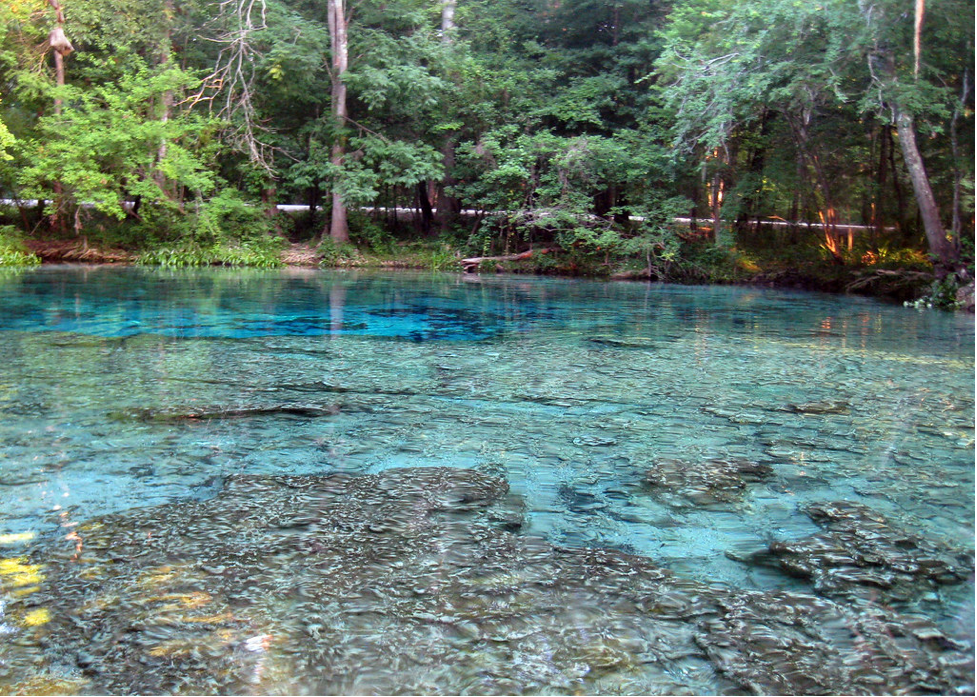A popular spring to many north Florida residents, Ginnie Springs will now be pumping out nearly one million gallons of water per day, per the permit granted to Seven Springs Water Co., a subsidiary of Nestle North America.
The spring itself is a popular recreational area that allows many to raft, swim and relax on a hot Florida day. Yet, the state’s plan of approval allows Nestle to drain over 400 million gallons of water per year.
State officials approved the permit on Feb. 23, which came with its fair share of backlash. The fight for the permit is a complex struggle that has been discussed for over two years. The original permit has allowed Seven Springs Water to pump water out of the Ginnie Springs aquifer since 1998.
The permit in place allowed Seven Springs to take out 1.152 million gallons a day. However, the company has only been taking out around 265,000 gallons a day. Nestle’s expansion plans say otherwise.
The Ginnie Springs bottling plant was bought out by Nestle in 2019 and has not been able to pass through the Suwannee River Water Management District board until recently. This was due to many concerns about the consumptive use of the springs and how it would benefit the community.
Seven Springs directly appealed such a decision to the Florida Division of Administrative. Their appeal was granted by Judge G.W. Chisenhall, claiming the permit would be beneficial to the local community.
This forced the board to reconsider the decision, pushing for a more “lenient” permit that would pump out 984,000 gallons of water per day rather than the previous 1.152 million.
However, it is necessary to point out how such an approval board has been formed. The current and successive Florida governors, Ron DeSantis and Rick Scott, respectively, have both curtailed environmental protection efforts to promote economic development.
All of the board members serving on the SRWMD have been appointed by those Republican governors. Scott notoriously has had a poor environmental record, yet, the terms look even more drab when one sees DeSantis’s state bill 712, which disallowed any city within the state to grant the environment legal rights.
The vote itself was unanimous. However, three of those who favored the permit are employees of the bottling plant. The other vote was from a representative of the Gilchrist County Commission where the taxes paid at the plant account for 7% of the county’s budget.
One of the more vocal groups against the Nestle permit regarding Ginnie Springs has been the Santa Fe River group. The president of the group, Michael Roth, has claimed that consumption would have to drop 30% beyond its current levels to prevent continuous environmental degradation.
Similarly, the group has been working with the Florida Defenders of the Environment to challenge the validity of the permit based on the fact that it provides no monetary benefit to the state of Florida.
Florida water laws make it illegal to transfer water off a property and not pay the state. The water law states that the pumping must benefit to serve the public, a statement which many are questioning.
However, those on the board working for the bottling plant express that Nestle is providing jobs, funding for community activities, and actively engaging in environmental-protectionist activities.
Similarly, many have drawn claims from Florida Geological Survey Bulletin. The survey proses to show how the pumping will go relatively unnoticed.
The evidence provided by the Florida Geological Survey publication shows how nearly 37 million gallons of water are already naturally being discharged per day.
However, this still does not regard the damage made to the physical environment that comes from the pumping and bottling process. The spring itself has had a near 40% reduction in its overall stream baseflow since 2001. This is a direct result of decreased rain levels and increased water pumping.
Featured image: Ginnie Springs. Unmodified photo by Alachua County used under a Creative Commons license. (https://bit.ly/3eO0LdN)
Check out other recent articles from the Florida Political Review here.






One Comment
Pingback: